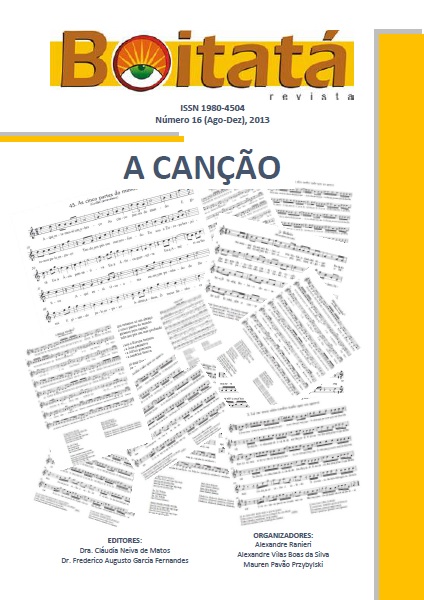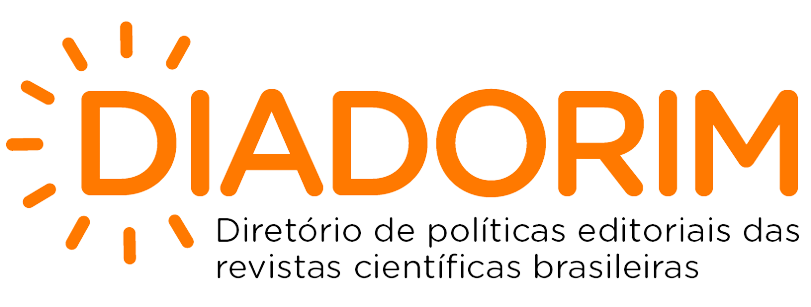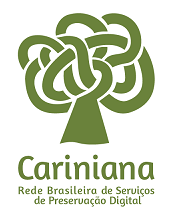A canção e a poesia no nacionalismo cultural irlandês
DOI:
https://doi.org/10.5433/boitata.2013v8.e31567Palabras clave:
Irlanda, Nacionalismo, Canção, PoesiaResumen
Numa perspectiva suplementar em relação às teses que creditam a constituição imaginária da nação a práticas escriturais como o jornal impresso e o romance, ressaltamos o papel desempenhado nesse exercício imaginativo pela literatura de expressão oral, especificamente a canção e a poesia. Para tanto, focalizamos o nacionalismo cultural empreendido na Irlanda, cuja população, majoritariamente iletrada, dependeu de poéticas orais para se imaginar como nação. Assim, avaliamos, mediante exame de canções e poemas produzidos pelo nacionalismo irlandês no século XIX e início do XX, o contributo da canção e da poesia para a criação e difusão de um sentimento de nacionalidade entre os irlandeses. Ao investigarmos a metaforização da Irlanda como uma mãe que, em relação aos filhos varões, mostra-se ora protetora, ora dependente, ora desleal, atentamos tanto para a instrumentalidade ideológica da literatura no sentido de instigar os irlandeses à luta pela descolonização quanto para seu efeito subjetivo como canalização de ansiedades decorrentes da experiência colonial.Descargas
Citas
BRANIM, John; BRANIM, Michael. The Chaunt of the Cholera: Songs for Ireland. London: James Cochrane, 1831.
CASEMENT, Roger. The Crime Against Ireland and how the War may Right it. New York: [s.n.], 1914.
CASSIDY, James F. The Women of the Gael. Boston: The Stratford Company Publishers, 1922.
COLUM, Padraic et al. The Irish Rebellion of 1916 and Its Martyrs: Erin’s Tragic Easter. Ed. Maurice Joy. New York: The Devin-Adair Company, 1916.
CROSS, Tom P.; SLOVER, Clark H. The Adventures of the Sons of Eochaid Mugmedon. In: CROSS, Tom P. (Eds.). Ancient Irish Tales. New York: Henry Holt & Co., 1936, p. 508-513.
CUILINN, Sliabh. Dear Land. In: SPARLING, Henry H. (Ed.). Irish Minstrelsy: Being a Selection of Irish Songs, Lyrics, and Ballads. London: Walter Scott, 1888, p. 122-123.
CULLINGFORD, Elizabeth B. Thinking of Her…as…Ireland: Yeats, Pearse and Heaney. Textual Practice, v. 4, n. 1, p. 1-20, 1990.
DELEUZE, Gilles; GUATTARI, Félix. L’Anti-Œdipe: capitalisme et schizophrénie. Paris: Minuit, 1972, v. 1.
DE VERE, Aubrey. The Year of the Sorrow; Ireland 1849. In: DE VERE, Aubrey. Selections from the Poems of Aubrey de Vere. Ed. George Edward Woodbery. London: Macmillan, 1894, p. 219-227.
DRENNAN, William. Fugitive Pieces, in Verse and Prose. Belfast: Finlay, 1815.
GAUTHIER, Jules. Le bovarysme: la psychologie dans l’oeuvre de Flaubert. Paris: L. Cerf, 1892.
HULL, Eleanor. Legends and Traditions of the Cailleach Bheara or Old Woman (Hag) of Beare. Folklore, v. 38, n. 3, p. 225-254, 1927.
INGRAM, John Kells. The Memory of the Dead. In: THE WRITERS OF THE NATION NEWSPAPER (Eds.). The Spirit of the Nation. Dublin: James Duffy, 1843, p. 48-50.
JONES, Ernest. The Island of Ireland: A Psycho-Analytical Contribution to Political Psychology. In: JONES, Ernest. Essays in Applied Psychoanalysis. London, Vienna: The International Psycho-Analytical Press, 1923, p. 398-411.
KEARNEY, Richard. Myth and Motherland. In: DEANE, Seamus et al. (Eds.). Ireland’s Field Day. Derry: Field Day Theatre Company, 1985, p. 61-80.
KEATING, Geoffrey (1644). My Pity How Ireland Standeth. In: PEARSE, Pádraic (Col.). Collected Works of Pádraic Pearse: Songs of the Irish Rebels and Specimens from an Irish Anthology. Some Aspects of Irish Literature. Three Lectures on Gaelic Topics. Dublin, Cork, Belfast: The Phoenix Publishing Co., 1918, p. 43-49.
KLEIN, Melanie. Contributions to Psycho-Analysis: 1921-1945. London: Hogarth, 1948.
LACAN, Jacques. Le Séminaire. Livre III: Les psychoses (1955-1956). Paris: Éditions du Seuil, 1981.
MACCANA, Proinsias. Women in Irish Mythology. The Crane Bag, v. 4, n. 1, p. 520-524, 1980.
MACDONNELL, John. Old Erin in the Sea. In: COLLINS, Charles MacCarthy (Org.). Celtic Irish Songs and Song-Writers. London: James Cornish & Sons; Dublin: Combridge & Co., 1885, p.150-154.
MAGEE, Jonh. Dublin Evening Post, 1 de julho de 1779.
MILLEN, William A. Songs of the Irish Revolution and Songs of the Newer Ireland. Boston: The Stratford Co., 1920.
MOORE, Thomas. The Poetical Works of Thomas Moore. Ed. J. M. Lake. Paris: A. and W. Galignani, 1829.
NANDY, Ashis. The Intimate Enemy: Loss and Recovery of Self under Colonialism. Delhi: Oxford University Press, 1983.
PEARSE, Pádraic. Collected Works of Pádraic H. Pearse: Political writings and speeches. Dublin, Cork, Belfast: The Phoenix Publishing Co., LTD, 1916.
Descargas
Publicado
Cómo citar
Número
Sección
Licencia
Derechos de autor 2013 Adelaine LaGuardia, Raimundo Sousa

Esta obra está bajo una licencia internacional Creative Commons Atribución 4.0.
Boitatá esta licenciada com CC BY sob essa licença é possível: Compartilhar - copiar e redistribuir o material em qualquer suporte ou formato. Adaptar - remixar, transformar, e criar a partir do material, atribuindo o devido crédito e prover um link para a licença e indicar se mudanças foram feitas.




















